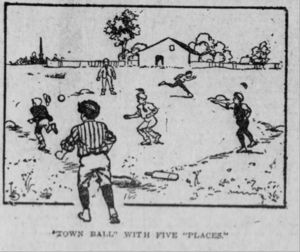1841.1: Difference between revisions
(Add review flag) |
No edit summary |
||
| (2 intermediate revisions by 2 users not shown) | |||
| Line 1: | Line 1: | ||
{{Chronology Entry | {{Chronology Entry | ||
|Year=1841 | |||
|Year Number=1 | |||
|Headline=Compendium Describes [Pentagonal] 5-Base Rounders, Feeder | |Headline=Compendium Describes [Pentagonal] 5-Base Rounders, Feeder | ||
|Salience=2 | |Salience=2 | ||
|Game=Rounders | |Game=Rounders | ||
|Text=<p>Williams, J. L., < | |Text=<p>Williams, J. L., <span style="text-decoration: underline;">The Every Boy's Book, a Compendium of All the Sports and Recreations of Youth</span> [London, Dean and Munday], per David Block, <span style="text-decoration: underline;">Baseball Before We Knew It</span>, page 205. This big book covered hundreds of children's pastimes, including feeder, the German game "ball-stock" (ball-stick), and a version of rounders that, unlike the 1828 <span style="text-decoration: underline;">Boy's Own Book</span> (see 1828 entry above) is played with five bases laid out in a pentagon instead of four in a diamond, and counter-clockwise running.</p> | ||
<p>< | <p><strong>For Text:</strong> David Block carries two long paragraphs and a field diagram of feeder, and a two-paragraph description of rounders, in Appendix 7, pages 284-286, of <span style="text-decoration: underline;">Baseball Before We Knew It.</span></p> | ||
|Comment=<p>The Savannah Morning News, Nov. 23, 1902, has a long article (with illustration) on what it calls "English Town ball." This game features 5 bases and clockwise running of the bases, and appears to be re-named as "5 base rounders."</p> | |||
|Source Image=Savannah Morning News Sun Nov 23 1902 .jpg | |||
|Reviewed=Yes | |Reviewed=Yes | ||
|Has Supplemental Text=No | |||
}} | }} | ||
Latest revision as of 07:06, 14 August 2023
| Prominent Milestones |
| Misc BB Firsts |
| Add a Misc BB First |
| About the Chronology |
| Tom Altherr Dedication |
| Add a Chronology Entry |
| Open Queries |
| Open Numbers |
| Most Aged |
Compendium Describes [Pentagonal] 5-Base Rounders, Feeder
| Salience | Noteworthy |
|---|---|
| Tags | |
| Location | |
| City/State/Country: | [[{{{Country}}}]] |
| Modern Address | |
| Game | RoundersRounders |
| Immediacy of Report | |
| Age of Players | |
| Holiday | |
| Notables | |
| Text | Williams, J. L., The Every Boy's Book, a Compendium of All the Sports and Recreations of Youth [London, Dean and Munday], per David Block, Baseball Before We Knew It, page 205. This big book covered hundreds of children's pastimes, including feeder, the German game "ball-stock" (ball-stick), and a version of rounders that, unlike the 1828 Boy's Own Book (see 1828 entry above) is played with five bases laid out in a pentagon instead of four in a diamond, and counter-clockwise running. For Text: David Block carries two long paragraphs and a field diagram of feeder, and a two-paragraph description of rounders, in Appendix 7, pages 284-286, of Baseball Before We Knew It. |
| Sources | |
| Warning | |
| Comment | The Savannah Morning News, Nov. 23, 1902, has a long article (with illustration) on what it calls "English Town ball." This game features 5 bases and clockwise running of the bases, and appears to be re-named as "5 base rounders." Edit with form to add a comment |
| Query | Edit with form to add a query |
| Source Image | |
| External Number | |
| Submitted by | |
| Submission Note | |
| Has Supplemental Text |
Comments
<comments voting="Plus" />

